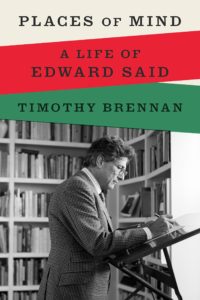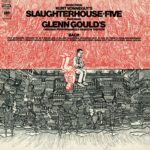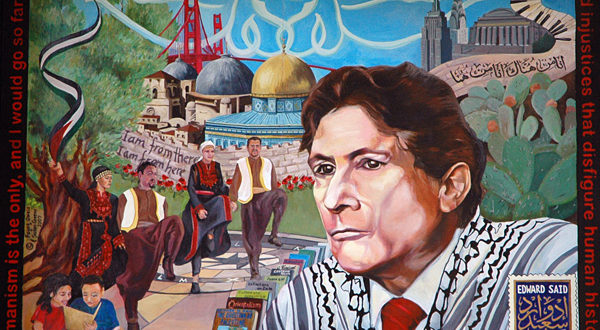Podcast: Play in new window | Download (Duration: 59:00 — 81.0MB)
 Today’s show is about the life and work of Edward Said, author, literary critic, teacher, musician, public intellectual, and Palestinian American.
Today’s show is about the life and work of Edward Said, author, literary critic, teacher, musician, public intellectual, and Palestinian American.
And all our music today comes from Canadian pianist Glenn Gould, a favorite of Edward Said’s and the subject of several of Said’s essays. Notably, “Glenn Gould, the Virtuoso as Intellectual” and “The Music Itself: Glenn Gould’s Contrapuntal Vision.” The pieces we’ll hear were chosen by Gould for use in the soundtrack to the 1972 movie of Kurt Vonnegut’s Slaughterhouse-Five, the hero of which, Billy Pilgrim, had come unstuck in time.
Edward Said, is perhaps best known as the author of Orientalism, the 1978 book that argues that Western scholarship about the Eastern World, is inextricably tied to the imperialist societies who produced it, and so is knowledge produced as an exercise in power and domination.
Said has been described as “the figure of an exile that is torn between loyalties to one’s nation and to the fellow humans whom the nation-state subjugates, and often domesticates. In ‘Reflections on Exile,’ he notes that ‘the interplay between nationalism and exile is like Hegel’s dialectic of servant and master, opposites informing and constituting each other.’ Said argues in the essay that exilic consciousness affects not only the exiles who are actually fleeing poverty and persecution but also those who do not feel at home in their own homes.”*
This sounds something of a lament, but near the end of Said’s book, Culture and Imperialism, he cites Hugo of St. Victor, a twelfth century monk from Saxony:
It is therefore, a source of great virtue for the practiced mind to learn, bit by bit, first to change about in visible and transitory things, so that afterwards it may be able to leave them behind altogether. The person who finds his homeland sweet is still a tender beginner; he to whom every soil is as his native one is already strong; but he is perfect to whom the entire world is as a foreign place. The tender soul has fixed his love on one spot in the world; the strong person has extended his love to all places; the perfect man has extinguished his.
He goes on to explain that
the “strong” or “perfect” person achieves independence and detachment by working through attachments, not by rejecting them. Exile is predicated on the existence of, love for, and a real bond with one’s native place; the universal truth of exile is not that one has lost that love or home, but that inherent in each is an unexpected, unwelcome loss. Regard experiences then as if they were about to disappear: what is it about them that anchors or roots them in reality? What would you save of them, what would you give up, what would you recover?
We might say, following Said, following Hugo of St. Victor, that the art of biography practices a form of exile.
 GUEST
GUEST
Timothy Brennan is professor of comparative literature, cultural studies, and English at the University of Minnesota. His books include At Home in the World: Cosmopolitanism Now, Wars of Position: The Cultural Politics of the Left and Right, and the new book, Places of Mind: A Life of Edward Said, an intellectual biography published by Farrar, Straus & Giroux.
RELATED
Arabs, Islam and the Dogmas of the West by Edward W. Said (NYT, Oct. 31, 1976)
In the Chair – Edward Said (LRB – review of two books, one on Glenn Gould)
Politics Lost: The Academic Left and Posthumanism (Interchange with Timothy Brennan)
The CIA Reads French Theory by Gabriel Rockhill
*”Home and Exilic Consciousness: Kurt Vonnegut’s Slaugherhouse-Five and William Spanos’ In the Neighborhood of Zero,” Ubaraj Katawal. symplokē , Vol. 24, No. 1-2.)
 MUSIC – Glenn Gould
MUSIC – Glenn Gould
Music from Kurt Vonnegut’s Slaughterhouse-Five
Concerto for Piano and Orchestra No. 5 in F Minor, BWV 1056: III. Presto
Concerto for Piano and Orchestra No. 5 in F Minor, BWV 1056: I. Allegro
Keyboard Concerto No. 3 in D Major, BWV 1054: I. Allegro
Goldberg Variations, Var. 25, 1981 (the soundtrack uses the 1955 variation)
Keyboard Concerto No. 3 in D Major, BWV 1054: III. Allegro
CREDITS
Producer & Host: Doug Storm
Executive Producer: Kade Young
 WFHB Bloomington Community Radio
WFHB Bloomington Community Radio


